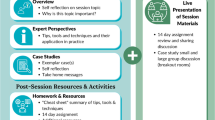Abstract
For students of the health care professions to succeed in today’s health care environment, they must be prepared to collaborate with other professionals and practice on interdisciplinary teams. As most will care for patients with cancer, they must also understand the principles of palliative care and its integration into oncology. This article reports the success of one university’s effort to design and implement an interdisciplinary curriculum teaching team-based palliative care in oncology which was mandatory for medical, nursing, social work, and chaplaincy students. Quantitative evaluation indicated that students made significant improvements related to palliative care knowledge and skills and readiness for interprofessional education. Qualitative feedback revealed that students appreciated the experiential aspects of the curriculum most, especially the opportunity to observe palliative teams at work and practice team-based skills with other learners. While there exist many obstacles to interprofessional education and hands-on learning, the value of such experiences to the learners justifies efforts to initiate and continue similar programs in the health sciences.
Similar content being viewed by others
References
Greer JA et al (2013) Early integration of palliative care services with standard oncology care for patients with advanced cancer. CA Cancer J Clin 63(5):350–362
Temel JS et al (2010) Early palliative care for patients with metastic non-small-cell lung cancer. N Engl J Med 363(8):733–742
Smith TJ et al (2012) American society of clinical oncology provisional clinical opinion: the integration of palliative care into standard oncology care. J Clin Oncol 30(8):880–887
National Comprehensive Cancer Network. Palliative Care Clinical Practice Guidelines. Clinical Practice Guidelines for Oncology 2014 [cited 2014 June 30]; Available from: http://www.nccn.org/professionals/physician_gls/pdf/palliative.pdf
National Hospice and Palliative Care Organization. Ground-breaking palliative resolution is adopted at World Health Assembly in Geneva. 2014 [cited 2014 July 15]; Available from: http://www.nhpco.org/press-room/press-releases/ground-breaking-palliative-care-resolution
National Research Council (2003) Health professions education: a bridge to quality. Institute of Medicine, Washington
Committee on Quality of Health Care in America (1999) To err is human: building a safer health system. Institute of Medicine, Washington
Institute of Medicine (2011) The future of nursing: leading change, advancing health. Institute of Medicine, Washington, p 620
Institute of Medicine (1972) Educating for the health team. National Academies Press, Washington
Committee on Planning a Continuing Health Professional Education Institute (2010) Redesigning continuing education in the health professions. Institute of Medicine, Washington
Committee on Quality of Health Care in America (2001) Crossing the quality chasm: a new health system for the 21st century. Institute of Medicine, Washington
Committee on the Health Professions Education Summit, Health Professions Education: A Bridge to Quality A.C. Greiner and E. Knebel, Editors. 2003, National Academy of Sciences Washington, DC
Health, D.o.H.R.f (2010) Framework for action on interprofessional education and collaborative practice. World Health Organization, Geneva
Zorek J, Raehl C (2013) Interprofessional education accreditation standards in the USA: a comparative analysis. J Interprof Care 27(2):123–130
Breitbart W, Rosenfeld B, Passik SD (1998) The network project: a multidisciplinary cancer education and training program in pain management, rehabilitation, and psychosocial issues. J Pain Symptom Manag 15(1):18–26
Galaychuk I (2000) Training of medical students and nurses to be members of cancer care teams. J Cancer Educ 15(2):65–68
Cable M, Parr M (2009) Evaluation of an online course on the care of teenagers and young adults with cancer. Paediatr Nurs 21(4):44–46
Koczwara B et al (2010) Reaching further with online education? The development of an effective online program in palliative oncology. J Cancer Educ 25(3):317–323
Fairchild A et al (2012) Initiation of a multidisciplinary summer studentship in palliative and supportive care in oncology. J Multidiscip Healthc 5:231–239
Head B et al (2014) The interdisciplinary curriculum for oncology palliative care education (iCOPE): meeting the challenge of interprofessional education. J Palliat Med 17(10):1107–1114
Lazenby M et al (2012) Validity of the end-of-life professional caregiver survey to assess for multidisciplinary educational needs. J Palliat Med 15(4):472–431
Mann K et al (2012) Development of a scale to measure health professions students’ self-efficacy beliefs in interprofessional learning. J Interprof Care 26(2):92–9
Hays DG, Singh AA (2012) The basics of qualitative data management and analysis, in qualitative inquiry in clinical and educational settings. Guilford Press, New York, p 295
Wear D (2002) “Face to face with it”: medical students’ narratives about their end-of-life education. Acad Med 77:271–277
Head BA et al (2012) “I will never forget”: what we learned from medical student reflections on a palliative care experience. J Palliat Med 15(5):535–41
Fischer MA et al (2008) Between two worlds: a multi-institutional qualitative analysis of students’ reflections on joining the medical profession. J Gen Intern Med 23:958–963
Wald HS, Reis SP (2010) Beyond the margins: reflective writing and development of reflective capacity in medical education. J Gen Intern Med 25:746–749
Acknowledgments
This work was funded in part by a grant from the National Cancer Institute (1R25CA148005).
Author information
Authors and Affiliations
Corresponding author
Rights and permissions
About this article
Cite this article
Head, B.A., Schapmire, T., Earnshaw, L. et al. Evaluation of an Interdisciplinary Curriculum Teaching Team-Based Palliative Care Integration in Oncology. J Canc Educ 31, 358–365 (2016). https://doi.org/10.1007/s13187-015-0799-y
Published:
Issue Date:
DOI: https://doi.org/10.1007/s13187-015-0799-y




